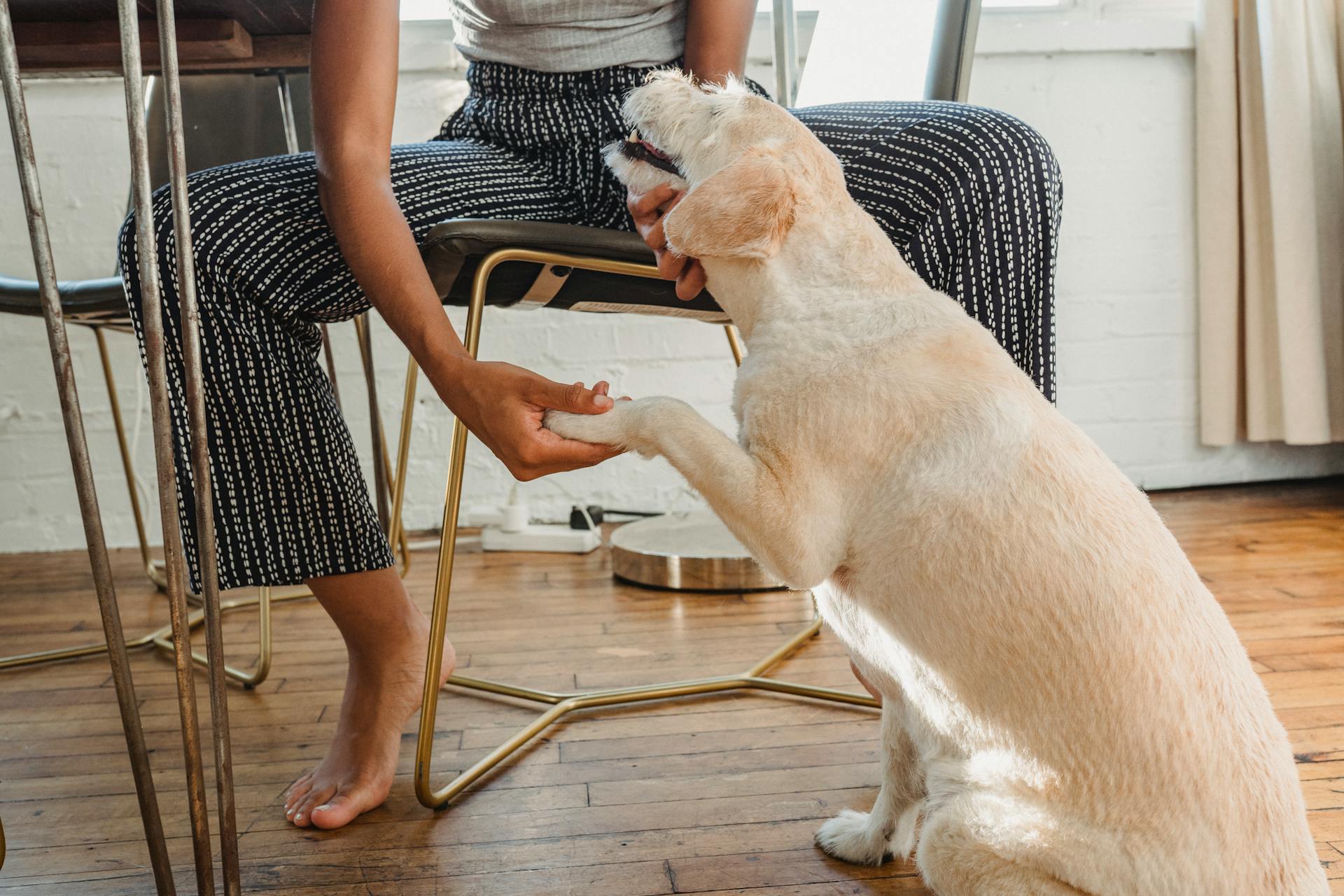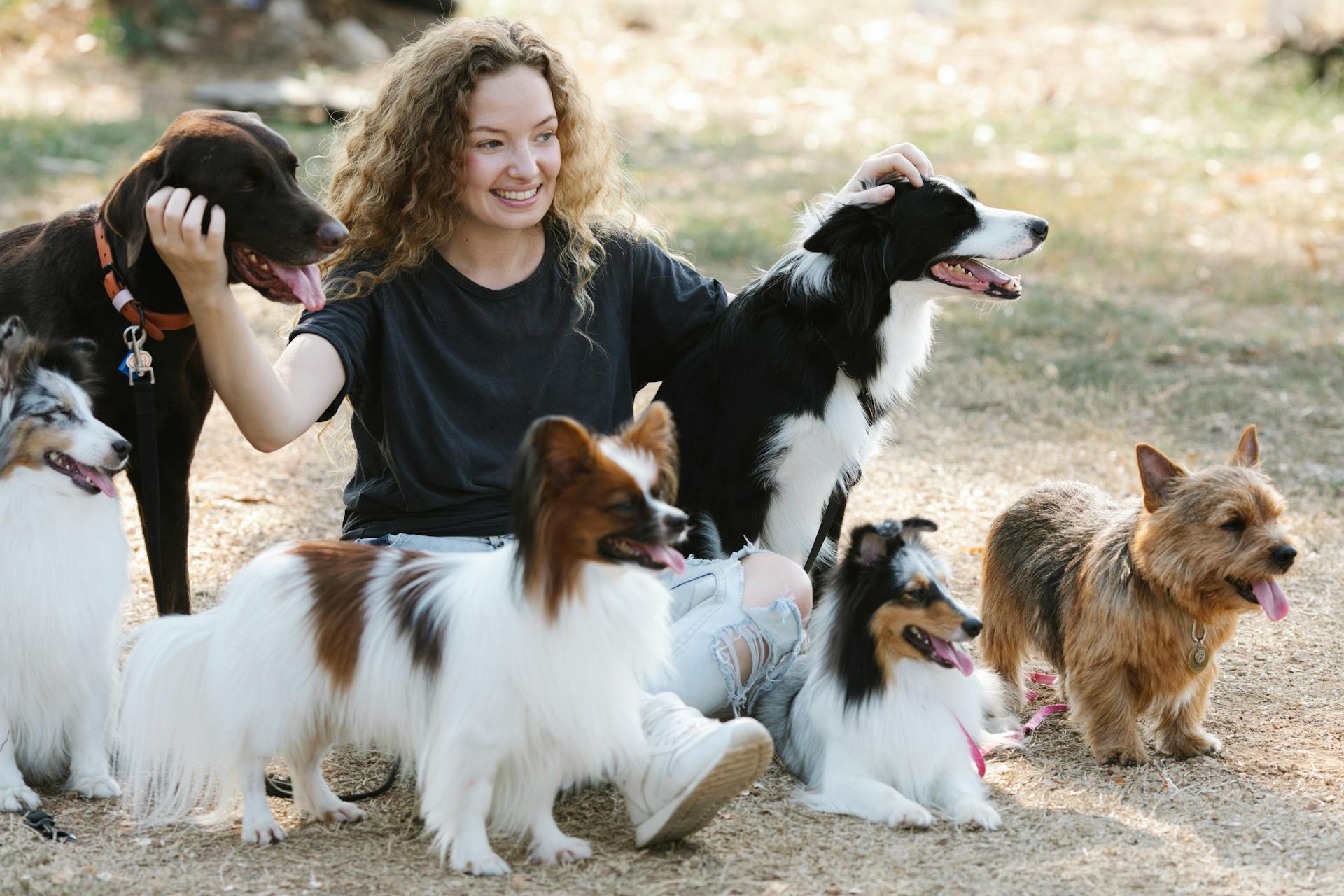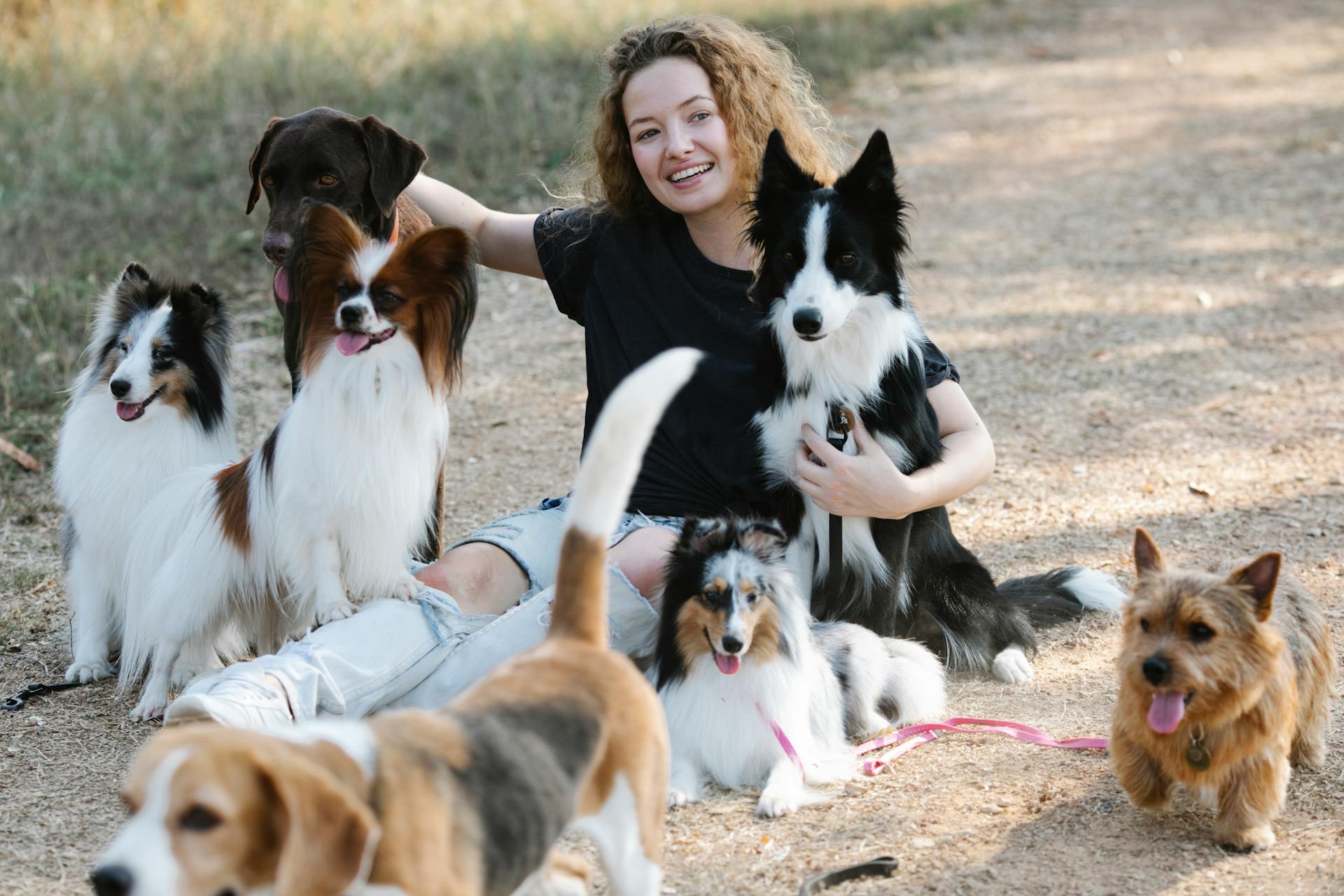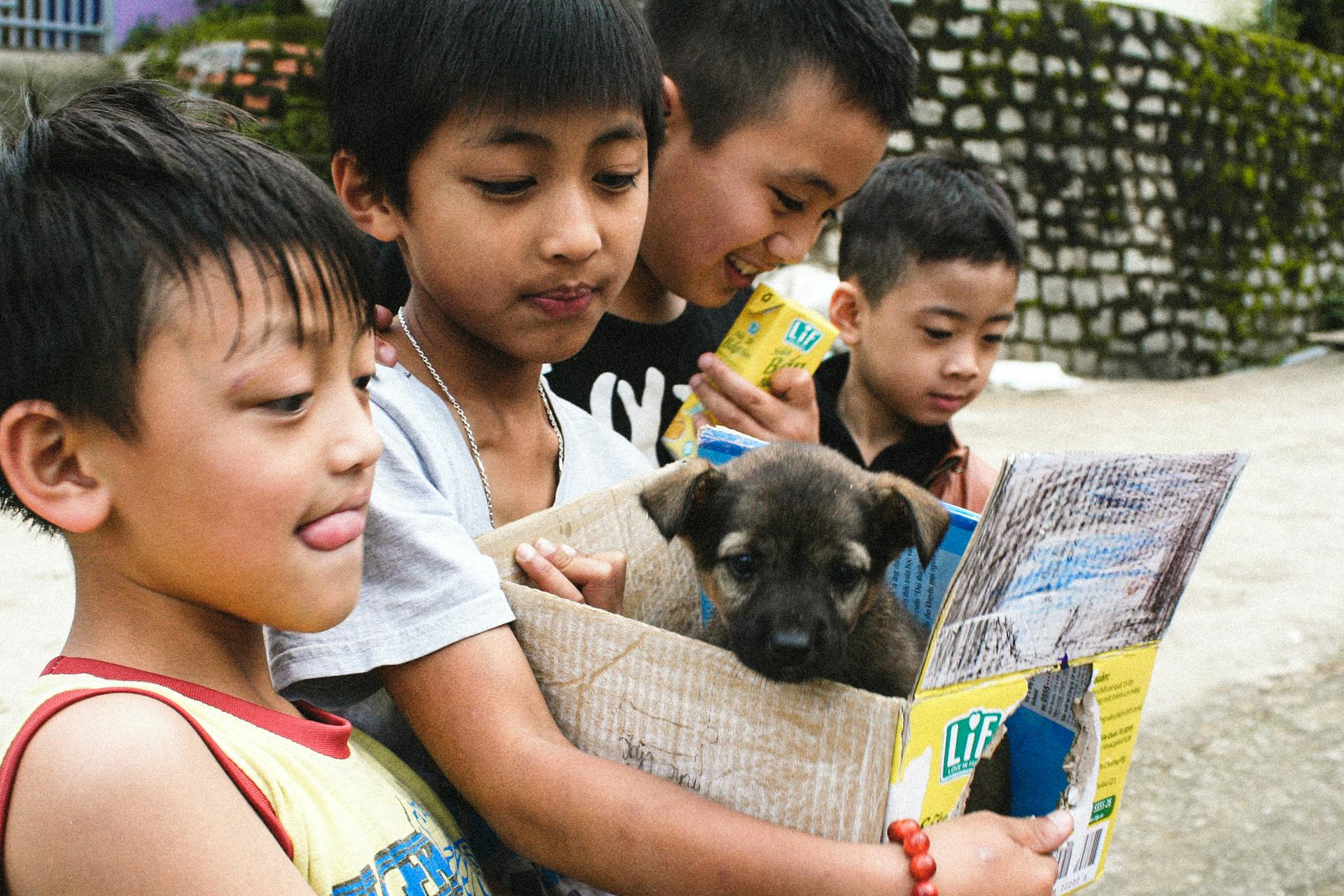
Caring for a female dog in heat requires attention to her physical and emotional well-being. A female dog in heat will typically experience a 3-week cycle of proestrus, estrus, and diestrus.
During proestrus, which lasts around 9-11 days, you may notice changes in her behavior, such as restlessness and whining. Her vulva will also swell and release a bloody discharge.
Female dogs in heat can become pregnant if they're not spayed, so it's essential to take steps to prevent unwanted breeding. This can be done by keeping her indoors, away from intact males, and using a muzzle or belly band to prevent mating.
A female dog in heat may also experience mood swings and irritability, so be patient and provide plenty of love and attention to help calm her nerves.
Suggestion: Does Spaying Calm down a Female Dog
How to Care for a Female Dog in Heat
Caring for a female dog in heat requires some extra attention and precautions to ensure her safety and comfort.

You should keep her away from male dogs while she's in heat to prevent unwanted pregnancy and reduce stress caused by male attention.
If your dog is spotting or bleeding on furniture or floors, put special diapers or clothing on her to catch the discharge.
Dogs in heat typically urinate more frequently, so give your dog extra potty breaks during this time.
You may notice personality changes, agitation, or anxiety while your dog is in heat. Provide extra playtime, exercise, and puzzle toys to help keep her busy.
Here are some tips to help you care for your female dog in heat:
- Keep her space clean by regularly changing bedding to prevent bacterial growth and infections.
- Monitor her closely for any changes in behavior or health that could indicate an infection or other health issue related to being in heat.
- Make sure you have enough supplies on hand, such as disposable diapers/pads and wipes, to clean up accidents due to increased urination frequency.
- Be patient and understanding, as your dog may act differently while she's in heat.
Understanding the Canine Cycle
A female dog's reproductive cycle, also known as the estrous cycle, is broken down into three phases: proestrus, estrus, and anestrus. These phases can last anywhere from a few days to four weeks, with an average length of seven to 10 days for proestrus, nine days for estrus, and four to five months for anestrus.
Explore further: Female Dog Heat Cycle Chart
A typical heat period lasts roughly two to four weeks, with a pregnancy or resting phase following the estrus period. Most dogs have about two heat cycles per year. The average length of a female dog's estrus cycle is around 21 days, but this can vary depending on the individual. It can last anywhere from four days to three weeks on average.
Common signs of a dog entering heat include frequent urination, vaginal bleeding and/or discharges, more attention paid to male dogs, excessive genital licking, and nervously aggressive behavior. These signs can help you identify when your female furry friend may be going into heat.
You might like: Stages of Female Dog in Heat
What Is a Cycle?
A dog's heat cycle, also known as estrous, is the time when a dog is fertile and ready to mate.
Female dogs typically go into heat once every six months, or about twice a year.
The frequency of a dog's heat cycle can vary depending on the breed size, with smaller dogs going into heat more often than larger dogs.
A dog's heat cycles may seem irregular when they first start to experience them.
Suggestion: Does Female Dog Get Her Period
Canine Cycle Stages
A female dog's reproductive cycle is called an estrous cycle and is broken down into three different phases: proestrus, estrus, and anestrus.
The proestrus phase is the beginning of the heat cycle, characterized by swelling of the vulva and a blood-tinged vaginal discharge. This phase can last anywhere from a few days to four weeks, averaging 7-10 days.
During the estrus phase, the female dog will allow mating to occur and is most fertile. This phase can last anywhere from three to 21 days, with an average length of nine days.
The anestrus phase is the timeframe when cycling ceases, usually lasting about four to five months, with no signs present.
A typical heat period lasts roughly two to four weeks, with a pregnancy or resting phase following the estrus period. Most dogs have about two heat cycles per year.
Here are the four stages of the canine heat cycle:
- Proestrus: Swelling of the vulva and a blood-tinged vaginal discharge, lasting 3-17 days.
- Estrus: A female dog will begin to naturally follow her breeding instinct, being most fertile and willing to accept male company, lasting 3-17 days.
- Diestrus: The dog's heat cycle begins to come to an end, lasting from the end of the estrus stage up until her puppies are born (60 days).
- Anestrus: The longest stage, lasting 100-150 days, also known as the resting stage.
A female dog will often go into heat once every six months (or about twice a year), but the breed size of the dog also affects the frequency of the cycle: a smaller dog may go into heat more often than a larger dog.
Recommended read: Does a Female Dog Go through Menopause
Identifying Heat Cycles
A female dog in heat will likely exhibit a range of behaviors and physical changes that can be a bit overwhelming if you're not prepared. Frequent urination is one of the most common signs that a dog is entering heat, especially if they're uncharacteristically urinating in the house.
Vaginal bleeding and/or discharges are also common, and will grow heavier and lighten in color as she enters the estrus stage. This can be a bit messy, so be prepared with plenty of puppy pads or newspapers.
If a female dog in heat sees a male dog, she'll "flirt" with him by exposing and raising her rear in his direction while moving her tail out of the way. This is her way of saying "hello" and getting attention.
Excessive genital licking is another sign that a dog is in heat. This can be a bit gross, but it's just her way of cleaning herself.
A unique perspective: Most Common Dog Names Female
Other signs of a dog in heat include tail tucking and the swelling of the vulva. These changes can be a bit subtle, but they're worth keeping an eye out for.
Here are some common signs of a dog in heat:
- Frequent urination
- Vaginal bleeding and/or discharges
- More attention paid to male dogs
- Excessive genital licking
- Nervously aggressive behavior
- Tail tucking
- Swelling of the vulva
Female Menstrual Cycle
A female dog's menstrual cycle is called an estrous cycle and is broken down into three phases: proestrus, estrus, and anestrus. Proestrus is the beginning of the heat cycle, characterized by swelling of the vulva and a blood-tinged vaginal discharge, and can last anywhere from a few days to four weeks.
The average duration of proestrus is seven to 10 days. During this phase, female dogs will not allow mating to occur. Estrus, also known as "heat", is the time when the female dog will allow mating to occur and can last anywhere from three to 21 days, with an average length of nine days.
A typical heat period lasts roughly two to four weeks, with a pregnancy or resting phase following the estrus period. Most dogs have about two heat cycles per year. Knowing what to expect will help prepare you and your dog for any abnormal behaviors or problems during her heat cycle.
On a similar theme: What to Expect from a Female Dog after Mating
Phases of the Estrous Cycle
A female dog's first heat cycle will occur sometime between 6 and 24 months of age, with small breeds tending to go into heat earlier than large breeds. It's essential to keep an eye out for signs that indicate your pup has gone into her first heat, such as increased whining and licking.
You might like: Female Dog First Heat
Signs of Labor
Labor can be a mysterious process, but there are some telltale signs that indicate it's time to head to the hospital.
False labor pains, also known as Braxton Hicks contractions, can start as early as 20 weeks into pregnancy, but they're usually more frequent and intense in the final weeks.
Your cervix starts to dilate and efface in the days leading up to labor, but it's not until it reaches 10 centimeters that you'll know for sure labor has begun.
You may notice a bloody show, also known as a mucous plug, which is a sign that your cervix is starting to dilate.
As labor progresses, you may feel a strong urge to move around and change positions frequently, as your baby is moving down the birth canal.
Contractions can be irregular at first, but as labor progresses, they'll become more regular and intense, lasting around 30-70 seconds.
Take a look at this: Dog Names Female Start with S
Signs of Female Menstruation

As your furry friend approaches adulthood, you may start to notice some changes in her behavior and physical appearance. These changes can be a sign that she's entering her heat cycle.
Bleeding is one of the most obvious signs of a female dog's menstrual cycle. You'll notice discharge from her vulva, which may start off light but become heavier and more bloody as the cycle progresses.
Increased urination is another common sign, especially around males. This is because your dog's hormones are in overdrive, making her more prone to accidents.
You may also notice behavioral changes, such as increased whining, licking herself excessively, and trying to escape from the house or yard. These behaviors are all normal signs that your dog is ready to mate.
Some dogs may become more vocal, whining and whimpering more than usual. Others may become clingier or try to mount other animals or objects.
Here are some common signs of a female dog's menstrual cycle:
- Bleeding or discharge from the vulva
- Increased urination, especially around males
- Behavioral changes, such as increased whining or trying to escape
- Increased vocalization or clinginess
- Swollen vulva or unusual discharge
Keep in mind that these symptoms can vary depending on your dog's breed and individual characteristics. If you're unsure about what's happening with your pup's reproductive system, it's always best to consult with your veterinarian.
Female Menstrual Cycle Length

A female dog's menstrual cycle, also known as the estrous cycle, can vary in length. The average length of a female dog's estrus cycle is around 21 days, but this can vary depending on the individual.
The cycle can last anywhere from four days to three weeks on average. This means that your pup may experience a heat cycle that lasts a few days or several weeks.
The duration of a human menstrual cycle varies from person to person, and the same is true for dogs. Every dog is different, and there can be variations among breeds, and even variations from one cycle to another in the same animal.
A typical heat period lasts roughly two to four weeks, with a pregnancy or resting phase following the estrus period.
Frequently Asked Questions
How to take care of your dog when she's on her period?
When your dog is in heat, provide her with treats, emotional support, and a safe space with easy access to food and water, while reducing her daily exercise. This care will help make her more comfortable during this time.
Sources
- https://yourpetandyou.elanco.com/us/behavior/how-to-tell-if-your-dog-is-in-heat
- https://www.petmd.com/dog/general-health/dog-in-heat
- https://www.thesprucepets.com/heat-cycle-for-dogs-3385378
- https://pawsandmorevet.com.au/female-dog-in-heat/
- https://www.fourpaws.com/pets-101/health-and-wellness/female-dogs-in-heat
Featured Images: pexels.com


